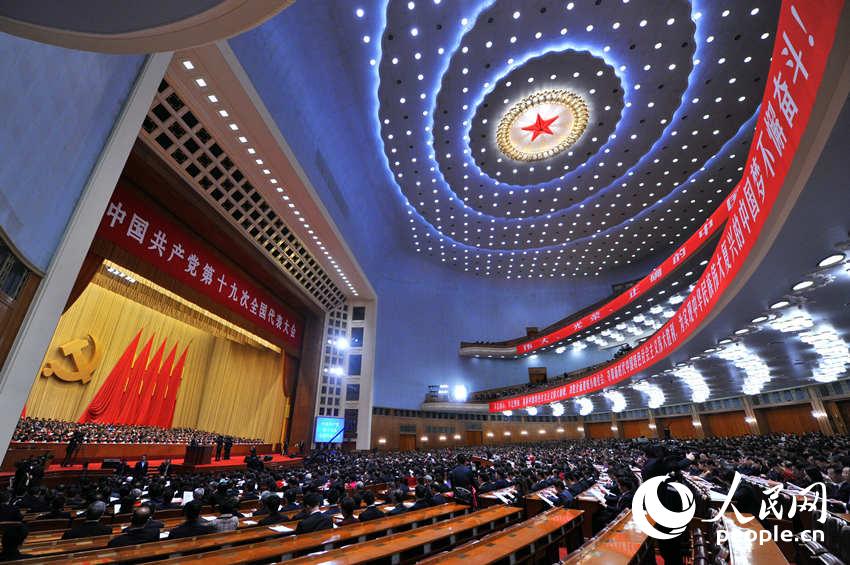


The Communist Party of China has vowed to satisfy the people's desire for "a better life" and written the idea into a key political document, as the latest assertion of the Party's people-centered approach.
The Chinese phrase "mei hao sheng huo", which can be translated as "a better life" or "a happy life", appeared 14 times, including in both the opening section and the last paragraph, in a report given by Xi Jinping on Wednesday at the opening of the 19th CPC National Congress.
The report at the five-yearly congress is considered the most important political speech in China.
This year's report said socialism with Chinese characteristics has entered a new era, and it draws up a two-stage development plan to build China into a "great modern socialist country" by mid-21st century, around the centennial of the founding of the People's Republic of China.
One of the key messages from Xi's report, a verdict on the principal issue facing Chinese society, has the word in it.
"What we now face is the contradiction between unbalanced and inadequate development and the people's ever-growing needs for a better life," Xi told more than 2,300 delegates from all walks of life attending the congress.
The needs to be met for the people to live a better life are increasingly broad, according to Xi.
Not only have their material and cultural needs grown, their demands for democracy, rule of law, fairness and justice, security, and a better environment are also increasing, he said.
It is not the first time that Xi has used the word "mei hao sheng huo."
"To meet the people's desire for a happy life is our mission," Xi said when meeting the press after being elected general secretary of the CPC Central Committee in late 2012.
Xi's statement was chimed later by the CPC's repeated pledge for a "people-centered approach", which is in line with the Party's fundamental purpose of wholeheartedly serving the people.
Also five years ago, the residents' per capita income was added into China's economic growth target, but the Party is determined to take care of more than the people's material needs.
It invested enormous efforts over past years into eliminating poverty, creating jobs and combating pollution in the world's most populous nation.
More than 60 million people have been lifted out of poverty since 2012. During the same period, an average of over 13 million urban jobs were created each year.
A "Beautiful China" initiative has been launched. Xi's quote, "Lucid waters and lush mountains are invaluable assets," has struck home and been championed by many officials as well as ordinary people.
For years to come, the Party vows to develop socialist democracy, strengthen cultural soft power, continue to build a beautiful China, improve the people's well-being and develop new approaches to social governance.
The CPC has announced it aims to see that socialist modernization is basically realized by 2035, and to develop China into "a great modern socialist country that is prosperous, strong, democratic, culturally advanced, harmonious, and beautiful" by mid-21st century.
By the end of the second stage, China will be "a global leader in terms of composite national strength and international influence" and the Chinese people will "enjoy happier, safer, and healthier lives."
 Fire brigade in Shanghai holds group wedding
Fire brigade in Shanghai holds group wedding Tourists enjoy ice sculptures in Datan Town, north China
Tourists enjoy ice sculptures in Datan Town, north China Sunset scenery of Dayan Pagoda in Xi'an
Sunset scenery of Dayan Pagoda in Xi'an Tourists have fun at scenic spot in Nanlong Town, NW China
Tourists have fun at scenic spot in Nanlong Town, NW China Harbin attracts tourists by making best use of ice in winter
Harbin attracts tourists by making best use of ice in winter In pics: FIS Alpine Ski Women's World Cup Slalom
In pics: FIS Alpine Ski Women's World Cup Slalom Black-necked cranes rest at reservoir in Lhunzhub County, Lhasa
Black-necked cranes rest at reservoir in Lhunzhub County, Lhasa China's FAST telescope will be available to foreign scientists in April
China's FAST telescope will be available to foreign scientists in April "She power" plays indispensable role in poverty alleviation
"She power" plays indispensable role in poverty alleviation Top 10 world news events of People's Daily in 2020
Top 10 world news events of People's Daily in 2020 Top 10 China news events of People's Daily in 2020
Top 10 China news events of People's Daily in 2020 Top 10 media buzzwords of 2020
Top 10 media buzzwords of 2020 Year-ender:10 major tourism stories of 2020
Year-ender:10 major tourism stories of 2020 No interference in Venezuelan issues
No interference in Venezuelan issues
 Biz prepares for trade spat
Biz prepares for trade spat
 Broadcasting Continent
Broadcasting Continent Australia wins Chinese CEOs as US loses
Australia wins Chinese CEOs as US loses